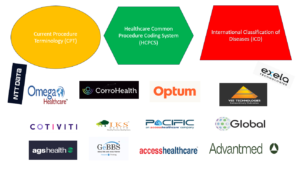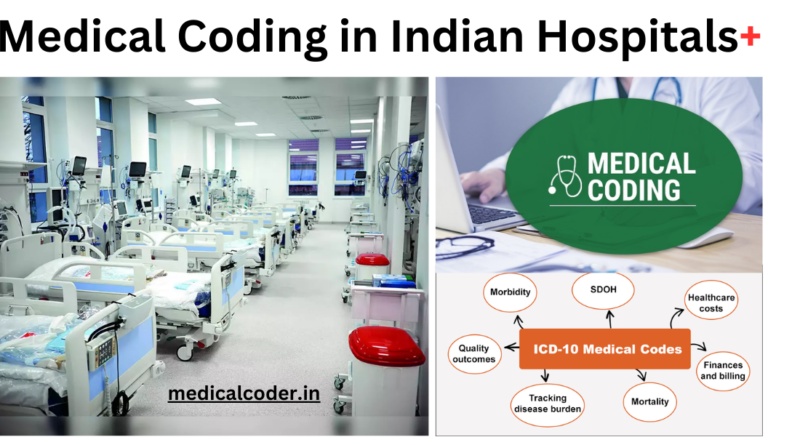Medical Coding in Indian Hospitals | Implementation and Benefits
Medical Coding in Indian Hospitals: Medical coding plays a crucial role in modern healthcare systems by converting medical diagnoses, treatments, and procedures into standardized codes.
While medical coding is widely practiced in countries like the United States, it is still in its early stages in India.
However, with the increasing adoption of health insurance and the need for accurate medical records, Indian hospitals are gradually embracing medical coding to improve efficiency and financial performance.
In this article, we will explore the current state of medical coding in Indian hospitals, its implementation challenges, and the key benefits it offers to the healthcare industry.
Also Read: Top 20 Medical Coding Companies in India
What is Medical Coding?
Medical coding is the process of translating healthcare services, diagnoses, procedures, and medical equipment into standardized alphanumeric codes.
These codes are based on internationally recognized classification systems like:
- ICD (International Classification of Diseases) – Used for diagnosing and recording diseases and conditions.
- CPT (Current Procedural Terminology) – Used for documenting medical, surgical, and diagnostic procedures.
- HCPCS (Healthcare Common Procedure Coding System) – Used for medical products, supplies, and services.
Medical coding ensures that healthcare services are accurately documented and billed, improving the overall efficiency of healthcare management.
Why Medical Coding is Important in Healthcare

Medical coding is essential for:
a. Accurate billing and reimbursement from insurance companies.
b. Ensuring compliance with healthcare regulations.
c. Streamlining clinical documentation and data analysis.
d. Supporting healthcare planning and resource management.
Current Status of Medical Coding in Indian Hospitals

Medical coding adoption in India is growing but remains limited due to several structural and regulatory factors.
1. Limited Use in Government Hospitals
- Most government hospitals in India still rely on manual billing and handwritten patient records.
- Medical coding is not mandatory for government-funded healthcare services.
- The absence of a standardized coding system in public healthcare facilities limits the use of coding.
2. Growing Adoption in Private Hospitals
- Leading private hospitals like Apollo, Fortis, Max Healthcare, and Medanta have started implementing medical coding.
- These hospitals use coding for:
- Streamlining insurance claims
- Improving patient care documentation
- Enhancing financial performance
- Private hospitals are more inclined to adopt medical coding due to their focus on patient billing and insurance reimbursement.
3. Influence of Health Insurance Growth
- Health insurance penetration in India has increased due to government programs like Ayushman Bharat and growing private health insurance coverage.
- As more patients rely on insurance for healthcare expenses, hospitals are being forced to adopt standardized coding for accurate billing and faster claim processing.
4. Outsourcing of Medical Coding
- India is a global hub for medical coding outsourcing.
- Many Indian coders are trained in ICD-10, CPT, and HCPCS codes to work for US-based healthcare providers.
- However, this expertise is primarily used for offshore services rather than for Indian hospitals.
Challenges in Implementing Medical Coding in Indian Hospitals

Despite the growing awareness and adoption of medical coding, Indian hospitals face several challenges:
🚫 1. Lack of Standardization
- India does not have a unified medical coding standard.
- While ICD-10 is recognized, it is not mandatory for billing and reimbursement.
🚫 2. Cost of Implementation
- Setting up medical coding systems requires investment in software, training, and infrastructure.
- Smaller hospitals and clinics may find it financially difficult to adopt coding systems.
🚫 3. Shortage of Skilled Coders
- While India has a large pool of trained coders, most work for outsourcing firms.
- Hospitals face challenges in hiring and retaining skilled medical coders.
🚫 4. Manual Billing Practices
- Many hospitals still rely on handwritten records and manual billing, which makes it difficult to transition to automated coding systems.
Benefits of Medical Coding in Indian Hospitals
Despite the challenges, the adoption of medical coding offers significant benefits to Indian healthcare providers:
✅ 1. Improved Billing and Reimbursement
- Proper coding ensures that hospitals receive accurate and timely payments from insurance companies.
- Reduces claim rejections and payment delays.
✅ 2. Better Clinical Documentation
- Coding improves the accuracy of patient records.
- Helps doctors and healthcare providers access detailed medical histories for better diagnosis and treatment.
✅ 3. Enhanced Operational Efficiency
- Reduces administrative workload by automating billing and claim processing.
- Improves hospital management and resource allocation.
✅ 4. Compliance with International Standards
- Using coding systems like ICD and CPT helps Indian hospitals meet global healthcare standards.
- Improves the credibility of Indian healthcare providers, especially for medical tourism.
✅ 5. Data Analytics and Healthcare Planning
- Medical coding allows healthcare providers to analyze treatment trends and patient outcomes.
- Helps hospitals plan better resource allocation and improve patient care quality.
How to Implement Medical Coding in Indian Hospitals
1: Invest in Medical Coding Software
- Hospitals should adopt reliable coding platforms like 3M CodeFinder, Optum360, or TruCode Encoder.
- Software should integrate with existing Electronic Health Records (EHR) systems.
2: Train Medical Coders
- Invest in training programs to build a skilled workforce.
- Encourage staff to obtain coding certifications like CPC (Certified Professional Coder).
3: Adopt International Coding Standards
- Use globally recognized coding systems like ICD-10, CPT, and HCPCS.
- Ensure that coding is integrated into patient documentation and billing.
4: Monitor and Audit Coding Accuracy
- Regularly audit coding accuracy and compliance with insurance and government guidelines.
- Update coding practices to reflect changes in healthcare policies.
Future of Medical Coding in Indian Hospitals
The future of medical coding in Indian hospitals looks promising due to:
a. Increasing health insurance coverage.
b. Growth of medical tourism.
c. Government incentives for digitization and healthcare modernization.
d. Improved availability of coding software and trained professionals.
As Indian hospitals transition toward more structured healthcare management, medical coding will play a key role in improving financial performance, patient care, and regulatory compliance.
Conclusion
Medical coding is gradually transforming the Indian healthcare industry.
While challenges such as lack of standardization and high implementation costs remain, the growing need for accurate billing and insurance claims is driving adoption.
Leading private hospitals have already recognized the benefits of medical coding, and with increased government support and improved infrastructure, medical coding is set to become a standard practice in Indian hospitals.
You can also read: Medical Coding Implementation and Its Benefits in India

